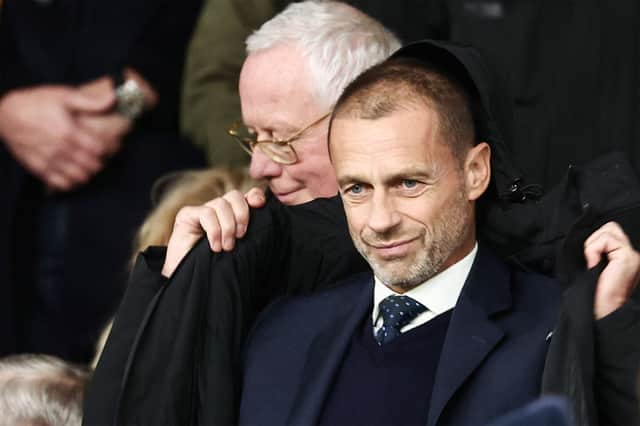UEFA deliver official Newcastle United stance after ownership 'change' & FFP scrutiny
and live on Freeview channel 276
Newcastle United's ownership model will not be scrutinised by UEFA, according to president Aleksander Ceferin.
This comes after a lengthy takeover process back in 2021 in which the Premier League insisted on being provided with legally binding assurances that Newcastle's incoming owners, the Saudi Arabian Public Investment Fund, were not controlled by the Saudi state. The takeover was eventually approved in October 2021 with PIF acquiring an 80% stake in the club while Jamie Reuben's RB Sports & Media and Staveley's Cantervale Holdings took 20% as JV1 Limited.
Advertisement
Hide AdAdvertisement
Hide AdThe shares between RB Sports & Media and Cantervale Holdings were initially equal at a 10% stake in the club each. But a JV1 Limited Companies House update earlier this month has confirmed that Staveley now holds just a 6% stake in the club, with RB Sports & Media's share increasing to 14%.
Since the takeover, Newcastle's ownership has faced regular scrutiny and criticism. Newcastle chairman and PIF governor Yasir Al Rumayyan has been described in official court documents filed in the US as a 'sovereign instrumentality of the Kingdom of Saudi Arabia and a sitting minister of the government' - raising fresh questions over the separation between the Saudi state and Newcastle.
UEFA president Ceferin praised Newcastle's 'Saudi ownership' for being a 'good example' of how to run a competitive football club. He also admitted he was 'not worried' about Newcastle's 'state' ownership, with a growing focus on clubs adhering to Financial Fair Play rules instead.
"In England, I think the Saudi-owned club is a good example of how you should work.” Ceferin said via The Guardian.
Advertisement
Hide AdAdvertisement
Hide Ad“Because Newcastle didn’t buy superstars yet they qualified for the Champions League. I was surprised. I expected them to buy many players for the new season, but it wasn’t the case and they played very well."
"I’m not worried about state-owned clubs as long as they respect the rules. I’m more worried about hedge fund-owned clubs.
"With hedge funds, you never know exactly who is behind them. It’s very hard to know because they are, many times, managing money for investors.
"Where I see a big difference, and maybe this is a bit simplistic, is that state-owned clubs want to win. Whether it’s also for name-washing or not, I don’t enter into this. But they want to win.
Advertisement
Hide AdAdvertisement
Hide Ad"With purely financial funds, it’s important to get money and winning is not the main goal. For state-owned clubs, the goal is not to take money out, so I think those clubs should be more sustainable.
"With the others, it’s very hard to know who is behind it. It can also be a hedge fund where a state is behind it. But I prefer that it’s clear ownership. And the rules are clear: if they don’t respect them, they get punished."


UEFA's FFP rules differ from the Premier League's profit and sustainability rules which limit English clubs to losses of £105million over a three-season period.
The rules have shackled Newcastle and many others in the transfer market with no signings made. Everton have also been handed a 10-point deduction for breaching PSR.
Advertisement
Hide AdAdvertisement
Hide AdUEFA's FFP rules are different in they cap spending on wages, transfers and agents' fees to 70% of a club's total revenue. The rules have been introduced in a phased manner at 90% for the 2023-24 season, 80% for the 2024-25 season and 70% for the 2025-26 season onwards.
Newcastle have had to adhere to both sets of financial rules this season. The club's staff cost-to-turnover ratio revealed in the latest club accounts stood at 74.1% for the 2022-23 campaign. There has been talk of the Premier League following suit with similar rules replacing the current PSR system. A two-day shareholders meeting will take place next month to discuss potential changes to PSR.
Comment Guidelines
National World encourages reader discussion on our stories. User feedback, insights and back-and-forth exchanges add a rich layer of context to reporting. Please review our Community Guidelines before commenting.
